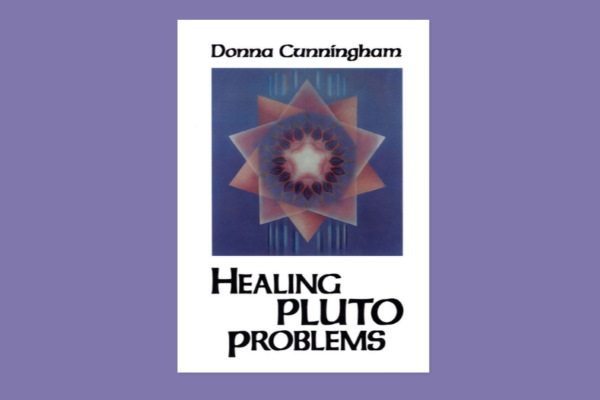By: Heather Figearo
In this truly remarkable text, Donna Cunningham treats her astrological readers to a new level of depth regarding this more modern outer planet. She also gives us a comprehensive examination of how Pluto can be experienced in its various permutations while also seeking to remediate possible harm through guided mediations and other methods that she specifically curates towards various Plutonian ailments.
Cunningham wins readers over with her conversational and doesn’t lose the intermediate reader with complex philosophical debate over the perceived implications of the planet, instead choosing to flesh out all the subterranean aspects of Pluto. This may at first surprise readers because of how deeply she treats the issues and the full-bodied approach she takes. What’s beautiful about this book is the gravity and meticulous care that is given over to the descriptions of Pluto and the various examples of how the planet’s influence can be felt throughout the lives of those individuals who have strong Plutonic charts.
It is in the early sections that Cunningham gives a very good descriptor of which kinds of people are typically Plutonian, and describes how they react to various stimuli. She builds a great crescendo of towering synthesis that goes beyond relying on signs and placements and seeks to capture the energy that Pluto brings to each situation, based on its power and the underlying themes.
Too many astrological treatments of Pluto get lost in wishy-washy new age speak, and too many are left with the impression that Pluto is only about transformation.
Cunningham gently disabuses her readers of this notion and explains succinctly that while Pluto does express those sides, he is also a planet that speaks of abuse, control, and obsession. Cunningham doesn’t leave the reader with these conclusions to navigate himself like so many other authors would. Instead, she adds sections to each “Pluto Problem” with her attention to guided meditation, visualization and even assistance with various flower remedies that can alleviate negative symptoms.
One of the things that was so intriguing about this book was the way Cunningham sought to tear down the planet so that every significator and situation got equal treatment and care. She didn’t shy away from describing the various unpleasantness of Pluto and that was refreshing, because as an intermediate student, too much of what I have read about Pluto has essentially neutered it, and this doesn’t reflect what I have seen in my own experience. Cunningham’s Pluto has power and depth, and it was very refreshing to see Pluto grow grand again, with all his warts, like abuse and corruption.
I also like Cunningham’s playfulness when she tells all those nosy Plutonians that she just knows they are reading along to see what she will say about them. That prompted a bark of laughter from me, proving that just because Pluto is dark doesn’t mean you can’t poke some fun at him.
This is a book highlights Pluto’s raw power for those who seek to really get to the bottom of the “transformation” conundrum that happens when astrological symbolism is not given thorough consideration and examination. Perhaps the darkness and intensity of Pluto isn’t friendly for some to consider and so it seems less scary to talk in terms of change and transformation and growth instead of death, grief, and abuse. Whatever you think you know about Pluto, the odds are there is a lot more to consider, and I would heartily recommend that you read this meaningful book, but give it a place on your shelf.



